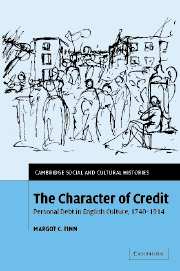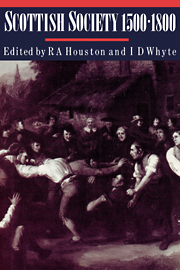The Character of Credit
Personal Debt in English Culture, 1740–1914
Part of Cambridge Social and Cultural Histories
- Author: Margot C. Finn, University of Warwick
- Date Published: August 2003
- availability: Available
- format: Hardback
- isbn: 9780521823425
Hardback
Other available formats:
Paperback
Looking for an inspection copy?
This title is not currently available on inspection
-
Personal credit relations were ubiquitous in English consumer markets, binding family members, friends, neighbours, customers and tradesmen in tangled lines of mutual obligation. In this study of the social history of personal debt and credit, Margot Finn reveals the pre-eminence of social individuals - men, women and children whose ability to engage in credit contracts was contingent upon their dependent social status. Using a wide range of printed and manuscript sources, and paying particular attention to distinctions of gender and of class, Finn examines English consumer culture from three interlocking perspectives: representations of debt in novels, diaries and autobiographical memoirs; the transformation of imprisonment for debt; and the use of small claims courts to mediate disputes between debtors and creditors. This major study of personal debt from 1740 to 1914 will appeal to social, legal and cultural historians, literary scholars and those interested in the history of consumer culture.
Read more- A major study based on first-rate archival scholarship over an extended time frame (1740–1914)
- In a dynamic series which encompasses a broad range of social and cultural histories
- Offers an interdisciplinary analysis of literary and historical sources, with particular appeal for social, economic, legal and cultural history scholars, scholars of English literature and those interested in history of consumer culture
Reviews & endorsements
'Finn has made us all her debtors, for an outstanding book that is a must for all historians of modern Britain. It is a major contribution to the growing field of consumer history.' The Times Higher Education Supplement
See more reviews'… draws upon an impressive - and sometimes almost intoxicating - range of contemporary source material … Finn's conclusions are challenging and important … The Character of Credit is an outstanding book that should be read by early modern and late modern historians alike.' The Economic History Review
'… fascinating …' Journal of Continuity and Change
'The questions it raises about the social and cultural embeddedness of economic relations are of major importance to economic historians, the history of the debtors' prisons in an outstanding piece of social history, and the work on plebeian encounters with civil law is of considerable significance … this is not just a book that deserves to be widely read, but a book which ought to prompt and guide a great deal of further research by historians … sets a high standard.' Reviews in History
'Margot Finn's book is an outstanding example of a new type of history that might be called the 'history of economic culture'.' The Historical Journal
Customer reviews
Not yet reviewed
Be the first to review
Review was not posted due to profanity
×Product details
- Date Published: August 2003
- format: Hardback
- isbn: 9780521823425
- length: 376 pages
- dimensions: 229 x 152 x 25 mm
- weight: 0.72kg
- contains: 10 b/w illus. 3 tables
- availability: Available
Table of Contents
List of illustrations
List of tables
Acknowledgements
List of abbreviations
Introduction
Part I. Debt and Credit in English Memory and Imagination:
1. Fictions of debt and credit, 1740–1914
2. Debt and credit in diaries and autobiographies
Part II. Imprisonment for Debt and the Economic Individual:
3. 'Mansions of misery': the unreformed debtors' prison
4. Discipline or abolish? Reforming imprisonment for debt
Part III. Petty Debts and the Modernisation of English Law:
5. 'A kind of parliamentary magic': eighteenth-century courts of conscience
6. From courts of conscience to county courts: small-claims litigation in the nineteenth century
7. Market moralities: tradesmen, credit and the courts in Victorian and Edwardian England
Conclusion
Bibliography
Index.
Sorry, this resource is locked
Please register or sign in to request access. If you are having problems accessing these resources please email [email protected]
Register Sign in» Proceed
You are now leaving the Cambridge University Press website. Your eBook purchase and download will be completed by our partner www.ebooks.com. Please see the permission section of the www.ebooks.com catalogue page for details of the print & copy limits on our eBooks.
Continue ×Are you sure you want to delete your account?
This cannot be undone.
Thank you for your feedback which will help us improve our service.
If you requested a response, we will make sure to get back to you shortly.
×











